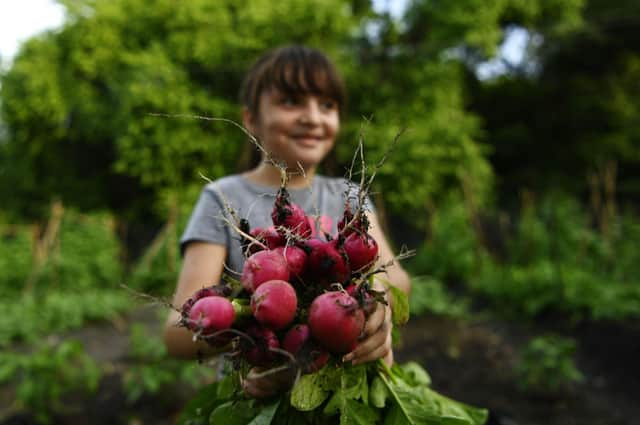Looming global food crisis should galvanise world into the action needed to ensure a sustainable future – Joyce McMillan


Whether or not your Christmas dinner lived up to the ideal, though, all of us in Britain are now facing a time when our relationship with food – never straightforward, since the industrial revolution drove most of us off the land and into the cities – is likely to be challenged, in increasingly testing ways. On one hand, the growing pressures on the NHS are drawing sharp attention to the fact that elements of the ordinary British diet are now making too many of us sick – overweight, diabetic, and poorly nourished in terms of basic protein and vitamins.
Only this week, the Royal College of Paediatrics and Child Health (RCPCH) described the levels of sugar in processed baby foods, designed for infants under 12 months, as “a national disgrace”; some contain more sugar than a Coca-Cola. Meanwhile, on an edition of the Today programme guest-edited by Jamie Oliver, the former Chancellor George Osborne was to be heard describing how he and David Cameron succeeded in introducing a statutory 20 per cent reduction in sugar levels in fizzy drinks marketed to children, but also lamenting that a proposed ban on junk-food advertising, particularly at times when children will see it, has failed to make any progress in the past decade.
Advertisement
Hide AdAdvertisement
Hide AdThe harsh fact is that our industrial and commercial system of food production provides the food industry with every incentive not only to produce food as cheaply as possible, but to stuff it with addictive ingredients – sugar, salt, and fat – which make it superficially attractive to consumers, while delivering little real nourishment, and often inflicting harm. And of course, the less real nutrition a product contains, the less it will satisfy hunger; so the consumer will keep buying more.
There are therefore only two forces which can stop the deterioration in food quality built into the market model. The first is organised consumer pressure, which certainly exists in Britain, but seems to have little impact on those lucrative areas of the market where resistance to junk food is low or non-existent. And the second and most obvious is government regulation. It is a cliche, but also a truth borne out by statistics, to say that the British diet was at its healthiest during Second World War rationing; and there is no question that the growing weakness of regulation, over the last 40 years, has left the UK food market increasingly vulnerable to the kind of damaging abuse outlined by the RCPCH this week.
And this crisis of poor nutrition, often masked by high superficial levels of consumption, is now sailing into a perfect storm of global disruption. The cost-of-living crisis has put even cheap junk food beyond the reach of many families, while undermining their ability to cook at home. Brexit has disrupted Britain’s easy access to the world’s largest and best-regulated food market, in the EU; and according to the UN, the war in Ukraine threatens a severe global food shortage in the next year.
Beyond all that lies the wider crisis of climate change and soil depletion, now bearing down on us with all the subtlety of a 40-ton truck. Already, we cannot be sure that commercially grown vegetables have the same nutritional content as 50 years ago, although we know that home-grown ones often taste better. As for climate change, anyone who imagines that increasingly frequent “weather-bomb” events like the current historic blizzard in North America will not have a drastic impact on some crops and food chains, is in severe denial. Farmers and supermarkets are ingenious of course, despite the numbers of UK farmers driven out of business in recent years. They have already worked miracles through Brexit and the pandemic, and will do all they can to keep filling their shelves, and ours.
The signs, though, are pointing inexorably towards a coming global crisis of food quality, affordability and availability. They say that we are what we eat, and that our food culture – the basic stuff of our survival – offers a vivid microcosm of the economic system in which we live. And what it seems to be telling us now is that we can no longer afford – financially or physically – simply to keep eating what a commercialised food industry puts in front of us. This autumn, for example, on a visit to the wonderful island of Lewis, I saw in sheltered spots everywhere the remains of the lazy beds where the people of the island used to grow crops of potatoes, oats and barley, to supplement the fish caught in Hebridean waters. Today, by contrast, it’s the Tesco van that weaves around the island roads, delivering a far wider and more exciting choice of food.
Yet that simple diet was rich in nutrition; and in these days of threatened crisis in our global food systems, it surely makes sense to think again about how little of our land is now cultivated for food, and how disempowered we are by our absolute inability to provide even basic elements of nourishment for ourselves.
And if a change in that situation were to act – as food culture so often does – as a metaphor for our wider politics, then so be it. For if now is not the time to recognise that many of our existing systems are failing to provide us with hope for a sustainable future, and that we need to begin to live differently from the grassroots up, then I am hard put to imagine how many more warning signals we might need; before we finally – and in the most practical ways possible – take the business of making change into our own hands.
Comments
Want to join the conversation? Please or to comment on this article.
